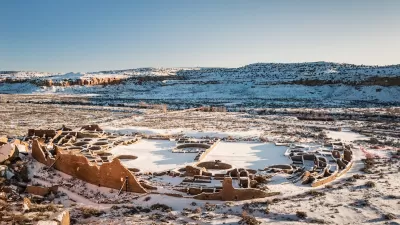The decision signals a new policy that respects tribal sovereignty and requires collaboration with local tribes.

The Federal Energy Regulatory Commission rejected seven hydropower energy storage projects proposed on Navajo Nation land, signaling a shift in policy at the agency that takes into account opposition by local tribes.
As Jonathan P. Thompson explains in The Land Desk, “The projects would have been located on Black Mesa, a significant landform on Navajo and Hopi land that was torn apart by intensive surface coal mining for over a half century.” The projects, which would require the construction of two new dams, would use water from a local aquifer already strained by mining and growing populations.
“The prospect of such impacts drew opposition from Tó Nizhóní Ání, Diné CARE, Grand Canyon Trust, and other land and water protectors. The Navajo Nation joined them, telling regulators the projects could impact its water rights, natural resources, endangered species, and cultural resources.”
Acknowledging tribal sovereignty, FERC’s new policy states, “the Commission will not issue preliminary permits for projects proposing to use Tribal lands if the Tribe on whose lands the project is to be located opposes the permit.”
FULL STORY: Feds reject energy projects on Navajo Nation

Maui's Vacation Rental Debate Turns Ugly
Verbal attacks, misinformation campaigns and fistfights plague a high-stakes debate to convert thousands of vacation rentals into long-term housing.

Planetizen Federal Action Tracker
A weekly monitor of how Trump’s orders and actions are impacting planners and planning in America.

In Urban Planning, AI Prompting Could be the New Design Thinking
Creativity has long been key to great urban design. What if we see AI as our new creative partner?

King County Supportive Housing Program Offers Hope for Unhoused Residents
The county is taking a ‘Housing First’ approach that prioritizes getting people into housing, then offering wraparound supportive services.

Researchers Use AI to Get Clearer Picture of US Housing
Analysts are using artificial intelligence to supercharge their research by allowing them to comb through data faster. Though these AI tools can be error prone, they save time and housing researchers are optimistic about the future.

Making Shared Micromobility More Inclusive
Cities and shared mobility system operators can do more to include people with disabilities in planning and operations, per a new report.
Urban Design for Planners 1: Software Tools
This six-course series explores essential urban design concepts using open source software and equips planners with the tools they need to participate fully in the urban design process.
Planning for Universal Design
Learn the tools for implementing Universal Design in planning regulations.
planning NEXT
Appalachian Highlands Housing Partners
Mpact (founded as Rail~Volution)
City of Camden Redevelopment Agency
City of Astoria
City of Portland
City of Laramie





























